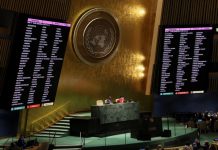US Special Envoy for Afghanistan Zalmay Khalilzad met with Abdullah Abdullah, chairman of the High Council for National Reconciliation, in Kabul on Monday.
According to a US State Department statement, Khalilzad has embarked upon a new round of travel to Kabul, Doha and the region “to discuss with Afghan leaders, representatives of the Taliban and other countries in the region who see their interests in a political solution, lasting peace and a comprehensive ceasefire in Afghanistan.”
“As always pleased to meet HE Zalmay Khalilzad & his accompanying delegation. We discussed the peace process, talks in Doha, the US current review & the steps forward. We reiterated our call for an immediate end to violence & the acceleration of the peace talks,” Abdullah wrote on Twitter.
Khalilzad discussed the peace process with Abdullah. “Development of the peace process, accelerating the process and the assessment of the Doha Agreement by the US new administration were main topics of the discussion,” said Fraidoon Khwazoon, a spokesman for Abdullah.
He is also expected to meet other Afghan officials.
ISLAMABAD VISIT: Meanwhile, sources say that Khalilzad is likely to arrive in Islamabad on March 2 on completion of his visit to Kabul.
In Islamabad, Ambassador Khalilzad will seek Pakistan’s point of view and advice on how to mature the peace deal after intra-Afghan talks in Doha, Qatar.
The meeting would come in the backdrop of Russia’s call to hold a quad meeting of Special representatives of Pakistan, US, China, and Russia on the Afghan peace process.
The US Special Representative will call on the civilian and military leadership and apprise them of the progress in the Afghan Peace Process, sources say.
Ambassador Khalilzad will dash to Doha from Islamabad where he will hold rounds of meetings with the Afghan Taliban.
Khalilzad’s trip comes exactly one year after the US-Taliban agreement. Under the agreement, the US pledged to withdraw foreign troops from Afghanistan by May 2021, and the Taliban pledged to cut ties with al-Qaeda and prevent other terrorist groups from entering Afghanistan.
Meanwhile, Abdul Salam Zaeef, the Taliban’s former ambassador to Islamabad, has hoped that “under the Doha Agreement, if this process goes ahead, the issue of Afghanistan can be resolved politically.”
The Afghan government, however, says the Doha Agreement has not yielded the desired results due to escalating violence by the Taliban.
“There is still nothing in the agreement to give hope to the Afghan people, and the Taliban are still killing the Afghan people,” said Rahmatullah Andar, a spokesman for the president’s national security adviser.
Negotiations between the Afghans were scheduled to begin ten days after the agreement was signed, but the release of 5,000 Taliban prisoners prevented this from happening until the Peace Consultative Loya Jirga decided to release 400 of the group’s high-profile prisoners. The Afghan government has released 5,000 Taliban prisoners, and the Taliban have released 1,000 Afghan prisoners.
Negotiations between the Afghans began on September 2, six months after the signing of the Doha Agreement, but the two sides took three months before agreeing only on the starting point for peace talks.
The basis of the Doha Agreement and Hanafi jurisprudence in the peace talks were two controversial issues that led to the continuation of the first round of talks for three months.
After the first round of talks, the Afghan delegation returned to Kabul and some members of the Taliban delegation, including Mullah Abdul Ghani Baradar, took a tour of the region for consultations. T the members of the Taliban delegation went to Russia, Iran, and Pakistan, but when they returned to Qatar three weeks later, talks on setting a negotiating agenda did not begin in a sincere way.
The second round of talks began coldly as the new US administration of President Joe Biden announced a revision of the Doha Agreement as a result of which it is suspended for 36 days.
Now that four meetings between the two groups have been held to determine the agenda of the talks, they have not yielded any results.
Sources familiar with the meetings say that the speed of the talks depends on announcing the results of the US review of the Doha Agreement.





